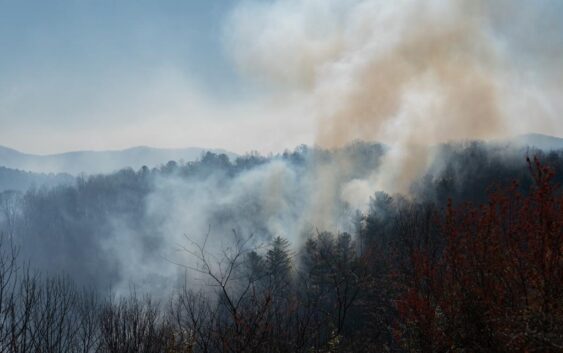- Wildfire in New Jersey Pine Barrens expected to grow before it’s contained, officials say
- Storm damage forces recovery efforts in Lancaster, Chester counties
- Evacuation orders lifted as fast-moving New Jersey wildfire burns
- Heartbreak for NC resident as wildfire reduces lifetime home to ashes
- ‘It’s only going to get worse’: Wildfire risk grows in western North Carolina
Wildfires threaten air quality across Carolinas

Smoke from wildfires poses a serious health risk for residents across the Carolinas.
CHARLOTTE, N.C. — Wildfires burning through western North Carolina are creating significant air quality challenges, with environmental officials warning residents about potential health risks from widespread smoke coverage.
The North Carolina Department of Environmental Quality is currently monitoring eight counties experiencing air quality issues, with some regions reaching critical alert levels.
Shawn Taylor, the public information officer for the Division of Air Quality, emphasized the widespread impact of the wildfires.
“Significant amounts of wildfire smoke contains a lot of what we call particulate matter, really tiny particles in the air that are not healthy to breathe in,” Taylor explained.
The current air quality situation is particularly severe in several counties. Transylvania and Henderson counties are classified in Code Purple, while Buncombe, Swain and Polk Counties are in the red zone, indicating potentially dangerous air conditions.
“The thing about the smoke is that it can travel great distances,” Taylor warned. “Even if you’re not immediately in the vicinity of where these fires are burning, the smoke can travel and impact you downwind several counties away.”
Megan Green, the air quality program manager with Mecklenburg County, noted the exceptional nature of the current situation, saying it typically takes exceptional events, like wildfires, to see those kinds of conditions in the Charlotte area.
Green emphasized the importance of adapting activities to current air quality conditions.
“When it comes to protecting your health on days with poor air quality, the recommendation is really that you modify your outdoor activity in line with pollution concentration,” she advised.
While Charlotte’s current air quality remains good, experts warn that conditions can change rapidly. Residents are advised to stay informed and check local air quality reports frequently.
The current situation echoes similar challenges from the 2023 Canadian wildfires, which similarly impacted air quality across the region.
Contact Myles Harris at mharris5@wcnc.com and follow him on Facebook, X and Instagram.